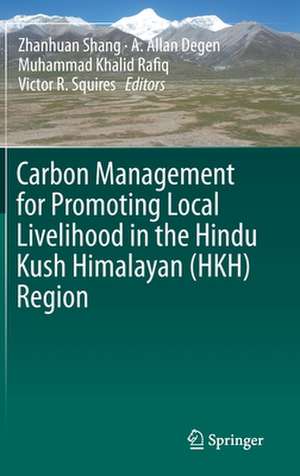Carbon Management for Promoting Local Livelihood in the Hindu Kush Himalayan (HKH) Region
Editat de Zhanhuan Shang, A. Allan Degen, Muhammad Khalid Rafiq, Victor R. Squiresen Limba Engleză Hardback – 2 aug 2019
This edited volume addresses two main questions: 1. Does carbon management offer livelihood opportunities or present risks, and what are they? 2. Do the attributes of carbon financing alter the nature of livelihood opportunities and risks? Chapters analyze the most pressing deficiencies in understanding carbon storage in both soils and in above ground biomass, and the related social and economic challenges associated with carbon sequestration projects. Chapters deliver insights to both academics from diverse disciplines (natural sciences, social sciences and engineering) and to policy makers.
| Toate formatele și edițiile | Preț | Express |
|---|---|---|
| Paperback (1) | 587.72 lei 6-8 săpt. | |
| Springer International Publishing – 14 aug 2020 | 587.72 lei 6-8 săpt. | |
| Hardback (1) | 701.77 lei 17-23 zile | +60.68 lei 5-11 zile |
| Springer International Publishing – 2 aug 2019 | 701.77 lei 17-23 zile | +60.68 lei 5-11 zile |
Preț: 701.77 lei
Preț vechi: 923.38 lei
-24% Nou
Puncte Express: 1053
Preț estimativ în valută:
134.30€ • 139.69$ • 110.87£
134.30€ • 139.69$ • 110.87£
Carte disponibilă
Livrare economică 20-26 martie
Livrare express 08-14 martie pentru 70.67 lei
Preluare comenzi: 021 569.72.76
Specificații
ISBN-13: 9783030205904
ISBN-10: 3030205908
Pagini: 290
Ilustrații: XXI, 347 p. 90 illus., 79 illus. in color.
Dimensiuni: 155 x 235 mm
Greutate: 0.72 kg
Ediția:1st ed. 2020
Editura: Springer International Publishing
Colecția Springer
Locul publicării:Cham, Switzerland
ISBN-10: 3030205908
Pagini: 290
Ilustrații: XXI, 347 p. 90 illus., 79 illus. in color.
Dimensiuni: 155 x 235 mm
Greutate: 0.72 kg
Ediția:1st ed. 2020
Editura: Springer International Publishing
Colecția Springer
Locul publicării:Cham, Switzerland
Cuprins
Chapter1: Managing Carbon Cycle Linkage to Livelihood in HKH Region.- Chapter2: Climate Change Mitigation and Pastoral Livelihood in the Hindu Kush Himalaya Region: Research Focuses, Opportunities and Challenges.- Chapter3: Tracking of Vegetation Carbon Dynamics from 2001 to 2016 by MODIS GPP in HKH region.- Chapter4: Livelihood and Carbon Management by Indigenous People in Southern Himalayas.- Chapter5: Effects of Different Grassland Management Patterns on Soil Properties on the Qinghai-Tibetan Plateau.- Chapter6: Carbon Management of the Livestock Industry in the HKH Region.- Chapter7: Wetlands as a Carbon Sink: Insight into the Himalayan Region.- Chapter8: Milk and Dung Production by Yaks (Poephagus grunniens): Important Products for the Livelihood of the Herders and for Carbon Recycling on the Qinghai-Tibetan Plateau.- Chapter9: Interactive Mechanism of Service Function of Ecosystems and the Effect of Climate Change to the Service Function of Ecosystem in Alpine Grassland of Tibetan Plateau.- Chapter10: Prospects of Biochar for Carbon Sequestration and Livelihood Improvement in the Tibetan Grasslands.- Chapter11: Optimizing the Alpine Grazing System to Improve Carbon Management and Livelihood for Tibetan Herders.- Chapter12: Promoting Artificial Grasslands to Improve Carbon Sequestration and Livelihood of Herders.- Chapter13: Prospects for REDD+ Financing in Promoting Forest Sustainable Management in HKH.- Chapter14: Designing Water Resource Use for Poverty Reduction in the HKH Region: Institutional and Policy Perspectives.- Chapter15: Indigenous Practice in Agro-pastoralism and Carbon Management from a Gender Perspective: A Case from Nepal.- Chapter16: Adaptation by Herders on the Qinghai-Tibetan Plateau in Response to Climate Change and Policy Reforms: the Implications for Carbon Sequestration and Livelihoods.- Chapter17: Developing Linkages for Carbon Sequestration, Livelihoods and Ecosystem Service Provision in Mountain Landscapes--Challenges and Opportunities in the Himalaya Hindu Kush (HKH) Region.- Chapter18: Experience for Future Good Practice and Policy of Combined Carbon Management and Livelihood in HKH Region.
Notă biografică
Dr. Zhanhuan Shang is a Professor at the School of Life Sciences, Lanzhou University in China.
Dr. Muhammad Khalid Rafiq is a Senior Scientific Officer at the Pakistan Agricultural Research Council in Islamabad, Pakistan.
Dr. Victor R. Squires is an Ex-Professor and Consultant at International Dryland Management Consultant, Adelaide University, Australia.
Textul de pe ultima copertă
This book contributes to our understanding of linkages between carbon management and local livelihoods by taking stock of the existing evidence and drawing on field experiences in the Hindu Kush Himalayan (HKH) region, an area that provides fresh water to more than 2 billion people and supports the world’s largest population of pastoralists and millions of livestock.
This edited volume addresses two main questions: 1. Does carbon management offer livelihood opportunities or present risks, and what are they? 2. Do the attributes of carbon financing alter the nature of livelihood opportunities and risks? Chapters analyze the most pressing deficiencies in understanding carbon storage in both soils and in above ground biomass, and the related social and economic challenges associated with carbon sequestration projects. Chapters deliver insights to both academics from diverse disciplines (natural sciences, social sciences and engineering) and to policy makers.
Caracteristici
Discusses carbon management and its linkages with livelihood improvement of the fragile communities of the Hindu Kush Himalayan (HKH) region Focuses on a region that has multidimensional ecological, economic, cultural and environmental significance Sheds new light on the social, economic, and policy perspectives associated with carbon management
